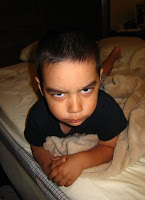ODD Children Who Hit Their Parents

The first thing a mother or father should realize is that aggressive behavior is common in children with Oppositional Defiant Disorder (ODD) . The young child suffering from ODD simply lacks the maturity to hold back his impulse to hit or kick. He may actually know that hitting is wrong, but can't control himself in the middle of his anger and frustration. Anger and frustration are major issues for ODD kids. When the defiant youngster gets angry, he is expressing his utter frustration at the lack of control that he has over his world. Something happens that deeply troubles him, but he lacks the tools to express his frustration appropriately. This further frustrates him, and he explodes in anger. He may strike at parents with the only tool at his disposal – by hitting. Growing up is hard work. Many times, kids who face mental health issues and are under a lot of stress go through an aggressive phase. This can be because they have less energy for self-control, or because...
